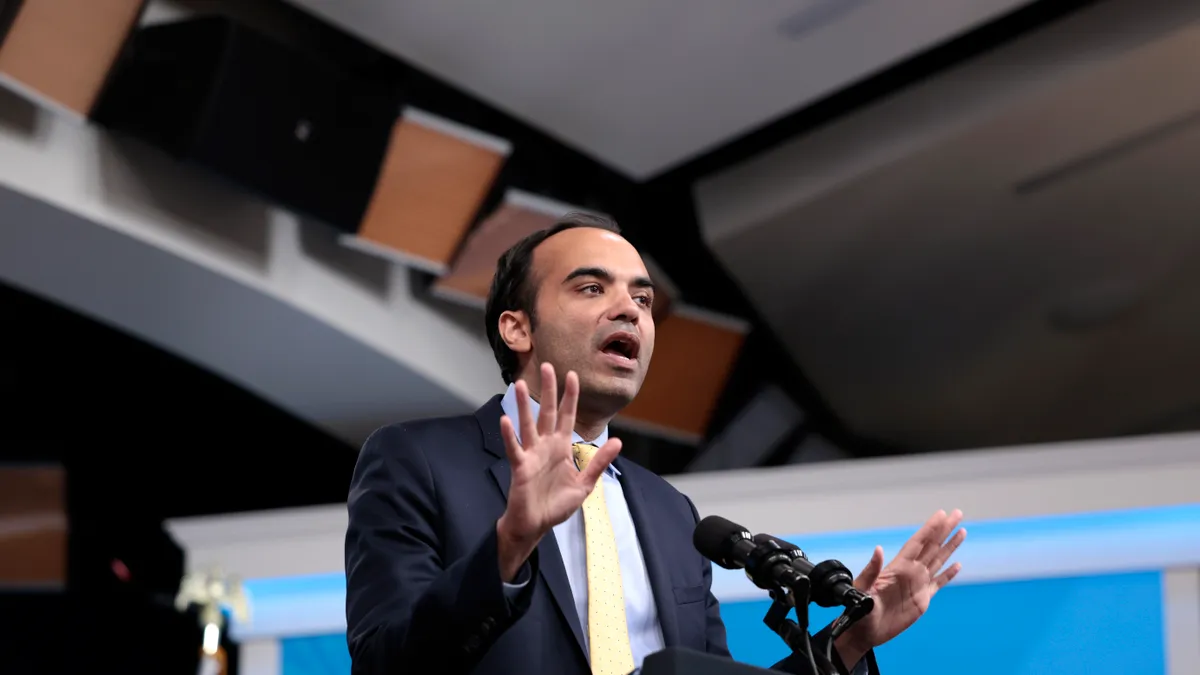Rohit Chopra, the director of the Consumer Financial Protection Bureau, declined to say whether he will resign from his post as President-elect Donald Trump takes office next month, noting that he is confirmed for a five-year term and can be removed at the president’s will.
While testifying Wednesday before the Senate Banking Committee, Chopra was asked by Sen. Tim Scott, R-SC, who takes over as chair of the panel next year, whether he planned to resign from his role at the CFPB on Jan. 20.
“As you know, we serve and are confirmed for a five-year term. The president can remove us at any time, any day, and we obviously completely respect that,” Chopra told Scott.
When Sen. John Kennedy, R-LA, probed further on whether the president could fire him, Chopra agreed.
“Yes, of course,” he said. “We serve at the pleasure of the president.”
Chopra’s predecessor, Kathy Kraninger, who led the CFPB during Trump’s first term, resigned less than an hour after President Joe Biden’s inauguration in January 2021, at Biden's request.
The president can fire the CFPB’s director at will, the U.S. Supreme Court ruled in Seila Law v. CFPB in 2020.
Democrat-appointed leaders at two other financial regulators – Federal Deposit Insurance Corp. Chair Martin Gruenberg and Securities and Exchange Commission Chair Gary Gensler each said last month they would resign, either Jan. 19 or 20.
Trump hasn’t been vocal about the CFPB director, but at least one close adviser – tech billionaire Elon Musk – called to dismantle the agency in a social media post last month.
Musk name-dropped the bureau in a post on X – which he owns – adding there “are too many duplicative regulatory agencies.”
Wednesday’s nearly two-hour hearing largely criticized the CFPB’s rulemaking activities during the waning days of the Biden administration.
Scott contended that prudential regulators, including the FDIC, Office of the Comptroller of the Currency, National Credit Union Administration and Federal Reserve, had agreed to pause rulemaking before the inauguration, but Chopra “has ignored these calls” and has advanced his agenda at “breakneck speed.”
Indeed, the CFPB on Thursday issued a final rule requiring banks and credit unions with more than $10 billion in assets to offer consumers a choice regarding overdraft fees, including a blanket fee of $5 per instance.
The CFPB also recently finalized a rule to supervise big tech payment firms and stop debanking, and launched rulemaking to address credit reporting for abuse survivors. The agency continues to work on removing medical debt from credit reports.
“I don't think it makes sense for the CFPB to be a dead fish,” Chopra said. “People between Election Day and Inauguration Day are still getting scammed, they're still being subjected to questionable account closures. They're still being the victims of so much wrongdoing.”
Chopra’s firm stance on several issues highlights that he “may not be there for the long haul,” Kent Belasco, director of Marquette University’s commercial banking program, said in an email last month.
Scott, for his part Wednesday, said changes at the CFPB are “absolutely necessary.”
“The agency is unaccountable to Congress, and Director Chopra seems intent on proving this to be true,” he said.
Chopra has led the CFPB since September 2021, and his tenure has seen ardent opposition. The CFPB’s very existence came into question when critics argued the agency’s funding comes from the Federal Reserve rather than Congress. Opponents argued that violates the U.S. Constitution’s separation-of-powers principles. But the Supreme Court upheld the bureau’s funding structure in May.














